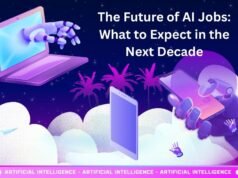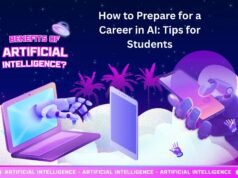1. Introduction to Artificial Intelligence (AI)
Artificial Intelligence (AI) is the simulation of human intelligence in machines, enabling them to perform tasks like learning, reasoning, problem-solving, and decision-making. With advancements in machine learning (ML), deep learning, natural language processing (NLP), and robotics, AI has become a cornerstone of modern technological innovation. Industries such as healthcare, finance, automotive, and entertainment are rapidly adopting AI, creating a surge in demand for skilled professionals.
2. Why Pursue a Career in AI?
- High Demand: The global AI market is projected to grow at a CAGR of 37.3% from 2023 to 2030 (Grand View Research).
- Lucrative Salaries: AI professionals earn 20–50% more than average IT roles.
- Interdisciplinary Impact: Opportunities span healthcare, climate science, education, and more.
- Innovation: Work on cutting-edge technologies like autonomous systems, generative AI, and quantum computing.
3. Core Technical Roles in AI
3.1 Machine Learning Engineer
Responsibilities:
- Design and deploy ML models.
- Optimize algorithms for scalability.
- Collaborate with data scientists and software developers.
Skills Required:
- Proficiency in Python/R, TensorFlow, PyTorch.
- Knowledge of statistics, linear algebra, and calculus.
- Experience with cloud platforms (AWS, Azure).
Industries Hiring: Tech firms (Google, Meta), finance (JP Morgan), healthcare (IBM Watson).
Average Salary: 120,000–160,000 (Source: Glassdoor).
3.2 Data Scientist
Responsibilities:
- Analyze large datasets to extract insights.
- Build predictive models using ML.
- Communicate findings to stakeholders.
Skills Required:
- SQL, Python, Tableau.
- Expertise in statistical analysis.
- Familiarity with big data tools (Hadoop, Spark).
Industries Hiring: E-commerce (Amazon), marketing, government.
Average Salary: 100,000–140,000.
3.3 AI Research Scientist
Responsibilities:
- Develop novel algorithms for AI applications.
- Publish research papers in journals like NeurIPS or ICML.
- Explore theoretical advancements in AI.
Skills Required:
- PhD in Computer Science or related fields.
- Strong grasp of reinforcement learning, NLP, or computer vision.
- Experience with CUDA, OpenCV.
Industries Hiring: Academia, OpenAI, DeepMind.
Average Salary: 150,000–200,000+.
3.4 Robotics Engineer
Responsibilities:
- Design AI-powered robots for automation.
- Integrate sensors and control systems.
- Test prototypes in real-world environments.
Skills Required:
- C++, ROS (Robot Operating System).
- Knowledge of mechanical engineering.
- Understanding of computer vision.
Industries Hiring: Manufacturing (Tesla), aerospace, agriculture.
Average Salary: 90,000–130,000.
4. Interdisciplinary AI Roles
4.1 AI Product Manager
Responsibilities:
- Define AI product roadmaps.
- Bridge technical teams and business stakeholders.
- Ensure ethical AI deployment.
Skills Required:
- Agile project management.
- Basic understanding of ML workflows.
- Market research and user experience (UX) design.
Industries Hiring: SaaS companies, startups.
Average Salary: 110,000–150,000.
4.2 AI Ethics Consultant
Responsibilities:
- Audit AI systems for bias and fairness.
- Develop guidelines for responsible AI.
- Advise policymakers on AI regulations.
Skills Required:
- Knowledge of ethics frameworks (EU AI Act).
- Familiarity with bias detection tools (IBM Fairness 360).
- Strong communication skills.
Industries Hiring: Government agencies, NGOs, consulting firms.
Average Salary: 80,000–120,000.
4.3 Healthcare AI Specialist
Responsibilities:
- Develop AI models for disease diagnosis.
- Analyze medical imaging (MRI, X-rays).
- Ensure compliance with HIPAA regulations.
Skills Required:
- Python, PyTorch, DICOM standards.
- Domain knowledge in biology or medicine.
- Collaboration with clinicians.
Industries Hiring: Biotech (Tempus), hospitals, pharma.
Average Salary: 95,000–135,000.
5. Emerging AI Niches
5.1 NLP Engineer
Focus: Develop chatbots, translation systems, sentiment analysis tools.
Tools: BERT, GPT-4, spaCy.
Industries: Customer service (Zendesk), media.
5.2 Computer Vision Engineer
Focus: Image recognition, facial recognition, autonomous vehicles.
Tools: OpenCV, YOLO, MATLAB.
Industries: Automotive (Waymo), surveillance.
5.3 AI in Climate Science
Focus: Predictive models for weather, carbon footprint optimization.
Tools: Climate Informatics libraries, Python.
Industries: Environmental agencies, renewable energy firms.
6. Education & Skill Development Pathways
6.1 Academic Degrees
- Bachelor’s: Computer Science, Mathematics.
- Master’s: AI, Data Science (e.g., Carnegie Mellon’s MS in AI).
- PhD: Specializations in ML, robotics, or NLP.
6.2 Certifications & Online Courses
- Coursera: Deep Learning Specialization by Andrew Ng
- edX: Microsoft AI Fundamentals
- Udacity: AI Programming with Python Nanodegree
6.3 Hands-On Practice
- Compete on Kaggle (www.kaggle.com).
- Build projects using GitHub repositories.
- Participate in AI hackathons.
7. Future Trends in AI Careers
- Generative AI: Roles in creating art, music, and content (e.g., DALL-E, ChatGPT).
- AI Legislation: Demand for legal experts in AI governance.
- Quantum Machine Learning: Intersection of quantum computing and AI.
8. Further Reading & Resources
- Research Papers: arXiv.org (Search for “AI” or “Machine Learning”).
- Industry Reports: McKinsey’s State of AI.
- Career Portals: AI Jobs Board, LinkedIn AI Groups.
- Ethics Frameworks: Partnership on AI.
9. Conclusion
AI offers diverse career paths, from technical roles like ML engineers to interdisciplinary positions in ethics and healthcare. Continuous learning and adaptability are critical due to the field’s rapid evolution. By leveraging online resources, certifications, and hands-on projects, aspiring professionals can position themselves at the forefront of AI innovation.














